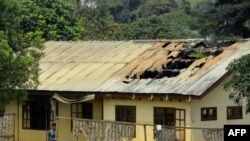The U.N. children’s fund reports more than 855,000 children in Cameroon’s Northwest and Southwest Anglophone regions are out of school, putting their future and the stability of the country at risk.
What began as a political crisis between Cameroon’s Anglophone and Francophone communities three years ago, has deteriorated into a full-blown humanitarian emergency. And, children are the major losers in this political, linguistic conflict.
Separatists in North-West and South-West Cameroon have put a ban on education in the region to protest government discrimination against English speakers. In the past three years, the U.N. children’s fund reports at least 70 schools have been destroyed and pupils and teachers have been kidnapped.
UNICEF spokeswoman, Marixie Mercado, says the separatists’ ongoing no-school policy is having a devastating impact on the children and their communities.
“Two months since the beginning of the new school year, around 90 percent of public primary schools, that is more than 4,100 schools and 77 percent of public secondary schools, that is 745 remain closed or non-operational… A very real fear of violence also keep parents from sending their children to school and teachers and staff from reporting to work," she said.
UNICEF says school keeps children safe; whereas, children who live in violent, unstable environments run many dangers when they do not go to school. It says they face the risk of recruitment as child soldiers, of child marriage, early pregnancy and other forms of exploitation and abuse.
Mercado says UNICEF is trying to minimize the harm to children wherever possible.
“In some areas where schools have been closed, community-run learning activities have been initiated so that children do not miss out further on their education. UNICEF is procuring schoolbooks and other learning materials for 37,000 school-age children, and we are training teachers, including on social cohesion and accelerated learning,” she said.
UNICEF is calling on all communities, armed groups and government authorities to protect education in all its forms and not to use children as pawns in their political battles.
The agency reports it has received less than half of the $20 million it needs this year to provide Cameroon’s children with a safe and protective learning environment. It is appealing to international donors to support this effort.




